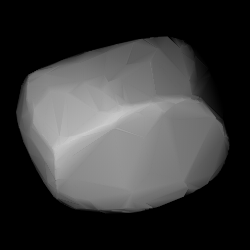117 Lomia
 3D convex shape model of 117 Lomia | |
| Discovery | |
|---|---|
| Discovered by | Alphonse Borrelly |
| Discovery date | 12 September 1871 |
| Designations | |
| (117) Lomia | |
| Pronunciation | /ˈloʊmiə/[1] |
| A871 RB;1900 DA; 1900 MC | |
| Main belt | |
| Adjectives | Lomian |
| Orbital characteristics[2] | |
| Epoch 31 July 2016 (JD 2457600.5) | |
| Uncertainty parameter 0 | |
| Observation arc | 123.03 yr (44938 d) |
| Aphelion | 3.0759 AU (460.15 Gm) |
| Perihelion | 2.90810 AU (435.046 Gm) |
| 2.99201 AU (447.598 Gm) | |
| Eccentricity | 0.028045 |
| 5.18 yr (1890.4 d) | |
Average orbital speed | 17.22 km/s |
| 317.47° | |
| 0° 11m 25.584s / day | |
| Inclination | 14.902° |
| 348.790° | |
| 52.461° | |
| Earth MOID | 1.92459 AU (287.915 Gm) |
| Jupiter MOID | 2.0407 AU (305.28 Gm) |
| TJupiter | 3.204 |
| Physical characteristics | |
| Dimensions | 148.71±6.6 km[2] 146.78 ± 3.96 km[3] |
| Mass | (6.08 ± 0.63) × 1018 kg[3] |
Mean density | 3.67 ± 0.48 g/cm3[3] |
Equatorial surface gravity | 0.0416 m/s² |
Equatorial escape velocity | 0.0786 km/s |
| 9.127 h (0.3803 d) | |
| 0.0528±0.005[2] 0.053[4] | |
| Temperature | ~161 K |
| XC[4] | |
| 7.95 | |
117 Lomia is a large main-belt asteroid that has a nearly circular orbit; the orbital eccentricity is 0.029.[2] It was discovered by French astronomer Alphonse Borrelly on September 12, 1871, from the Marseilles Observatory.[5] The preliminary orbital elements were published in the following year by German astronomer Friedrich Tietjen.[6] The reason for the name is uncertain, but Lutz D. Schmadel believes it is most likely a misspelling of Lamia, the female demon of Greek mythology (the asteroid 248 Lameia is also named after this figure).[5]
Photometric observations of this asteroid in 1985 gave a light curve with a period of 9.127±0.009 hours and a brightness variation of 0.29±0.03 in magnitude. The curve is symmetrical with a single maxima and minima. This object has a spectrum that matches an XC classification; occupying the transition range between an X-type and a C-type asteroid.[4] It has an estimated cross-section diameter of ~148 km.
Eight occultations of stars by Lomia have so far been observed, between 2000 and 2018. Four of these events provided two or more chords across the asteroid, including a four-chord event in 2003.
References
[edit]- ^ Per 'Lamia', which this is a misspelling of.
- ^ a b c d Yeomans, Donald K., "117 Lomia", JPL Small-Body Database Browser, NASA Jet Propulsion Laboratory, retrieved 12 May 2016.
- ^ a b c Carry, B. (December 2012), "Density of asteroids", Planetary and Space Science, 73 (1): 98–118, arXiv:1203.4336, Bibcode:2012P&SS...73...98C, doi:10.1016/j.pss.2012.03.009. See Table 1.
- ^ a b c di Martino, M.; et al. (July 1995), "Intermediate size asteroids: Photoelectric photometry of 8 objects.", Astronomy and Astrophysics Supplement, vol. 112, pp. 1–7, Bibcode:1995A&AS..112....1D.
- ^ a b Schmadel, Lutz D. (2003). Dictionary of Minor Planet Names. Springer Science & Business Media. p. 25. ISBN 978-3-540-00238-3.
- ^ Tietjen, F. (1872), "Elemente und Ephemeride des Planeten (117) Lomia", Astronomische Nachrichten, 78 (21): 329–330, doi:10.1002/asna.18710782106. See Table 1.
External links
[edit]- 117 Lomia at AstDyS-2, Asteroids—Dynamic Site
- 117 Lomia at the JPL Small-Body Database


 French
French Deutsch
Deutsch